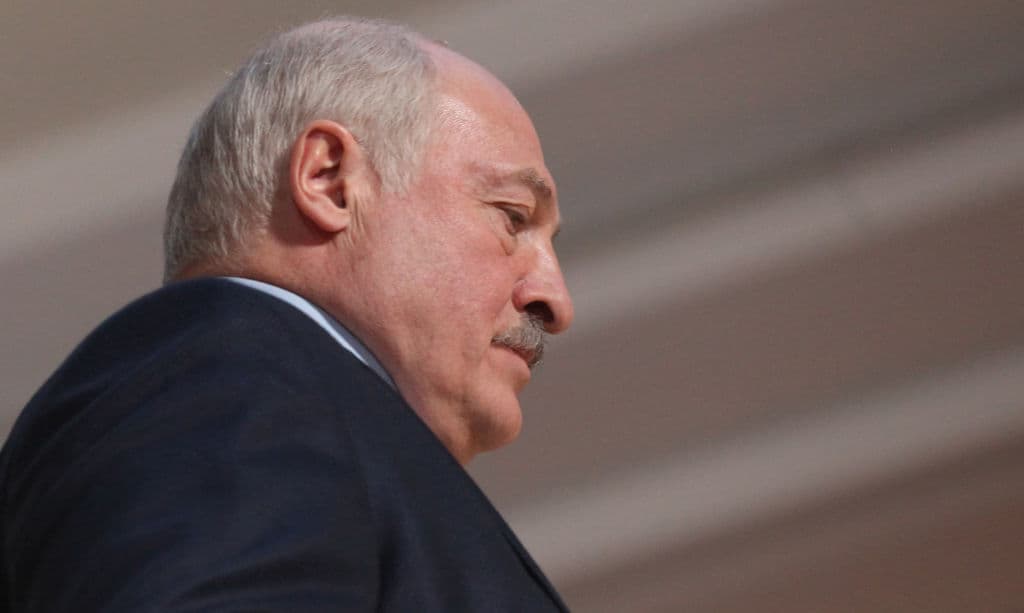Belarus Weekly: Ukraine says Moscow to strike Belarus in 'false flag' operation

As Russian troops withdraw from Kherson amid a successful Ukrainian counteroffensive, concerns over false flag operations from Belarus intensify.
Ukrainian intelligence warns of potential staged provocations by Russia at Belarusian critical infrastructure sites, which it says Moscow will blame on Kyiv.
An independent Belarusian railway initiative says Minsk has transferred 65,000 metric tons of ammunition to Russia since the start of Russia’s full-scale war.
Ukraine further distances itself from Belarus as parliament terminates a tax agreement with Belarus.
A French investigative journalism initiative accuses furniture giant IKEA of sourcing furniture made by Belarusian prisoners.
Intelligence: Russia to strike Belarus and blame Ukraine
According to the Ukrainian Defense Ministry’s Intelligence Directorate, Russia plans to stage a series of provocations aimed at Belarus’ critical infrastructure and blame Ukraine.
The directorate said Russia will likely conduct false flag operations in Belarus’ Hrodno and Brest regions, bordering Ukraine and the European Union. One of the central targets is reportedly the Astravets Nuclear Power Plant.
The Russian attacks will allegedly be blamed on NATO and Ukraine.
No additional sources have yet confirmed the allegations.
On November 19, the Belarusian Border Guard claimed it had video footage of a Ukrainian serviceman who “illegally crossed the (Ukrainian-Belarusian) border, took photos and videos of the area, and searched for or installed something in the snow.”
Such an incident “may lead to an armed clash,” Belarus’ Border Guard said.
Ukrainian authorities have yet to comment on the accusations.
Belarus has sent 65,000 metric tons of ammunition to Russia since February
According to the Community of Railroad Workers of Belarus, a Belarusian opposition initiative of railway workers, Belarus has sent 65,000 metric tons of ammunition to Russia.
According to the initiative, Belarus exported the largest amount of ammunition to Russia in April – over 22,000 metric tons. The export of ammunition to Russia peaked again in September at over 14,000 metric tons.
In October, Minsk also transferred 211 units of military equipment from Belarus to Russia, including tanks, military vehicles, and infantry fighting vehicles.
Since the start of Russia’s full-scale invasion, Russia has relied extensively on Belarus’ railway system to transport both troops and equipment, including to the front line in Ukraine.
As a result, Belarus’ railway system has become a target for Belarusian railroad saboteurs that oppose the war.
In March alone, 38 railway employees were detained by Belarusian authorities. Since then, many Belarusian railway workers have faced pressure from authorities.
Verkhovna Rada terminates Ukraine-Belarus agreement to avoid double taxation
Ukraine’s parliament has voted to terminate the agreement between Kyiv and Minsk that aimed at preventing tax evasion and double taxation of citizens.
A total of 304 Ukrainian lawmakers voted in favor of terminating the agreement, which had been in effect since 1994.
Once terminated, Belarusian citizens residing in Ukraine will be required to pay the general tax rate of 15% rather than the preferential 10% rate.
Ukraine will also be exempt from having to exchange tax-related information with Belarus.
Ukraine’s Finance Ministry said the move is aimed at further “cutting off economic and financial ties” with Belarus, given its role as a co-belligerent in Russia’s full-scale war.
Belarus reports deaths at EU-Belarus border amid ongoing migrant crisis
The Belarusian Border Guard alleged that three people have died along Belarus’ borders with the EU.
This week, Belarusian border guards claimed to have found the bodies of three migrants from the Middle East and North Africa along Belarus’ borders with Poland and Lithuania.
On Nov. 19, Polish border guards stationed at the Belarus-Poland border reported that 43 people attempted to illegally cross the border.
The migrant crisis engineered by Minsk started to unfold in May 2021, when Belarusian dictator Alexander Lukashenko said he was no longer willing to protect the EU’s borders from migration and facilitated an influx of migrants to Belarus.
The crisis peaked in November 2021 when Belarus forced thousands of asylum-seekers to cross Belarus’ border into the EU.
On June 8, 2021, Human Rights Watch published a report stating that migrants stuck at the Belarusian Bruzgi refugee facility at Belarus’ border with Poland faced beating, extortion, and sexual abuse.
While the facility closed in March 2022, the crisis persists as dozens of crossing attempts are registered daily, prompting Poland, Latvia, and Lithuania to build walls along their borders with Belarus.
Media investigation says IKEA sourced furniture made by Belarusian prisoners
A report published on Nov. 17 by French investigative journalism initiative Disclose alleged that IKEA had sold furniture made by prisoners serving sentences in Belarusian penal colonies under forced labor conditions.
Disclose, citing accounting records and witness interviews, claims that a minimum of 10 of IKEA’s subcontractors in Belarus “had ties with penal colonies over the past 10 years.”
“These are forced labor camps that are particularly brutal, known for practicing torture as well as food and healthcare deprivation, the exact opposite of the values flaunted by the Swedish firm,” the report claimed.
In a statement on Nov. 21, IKEA said it is “investigating the claims,” noting that it has “no evidence to substantiate the claims made in the news reports.”
IKEA discontinued sourcing from Russia and Belarus following Russia’s full-scale invasion of Ukraine in February.











